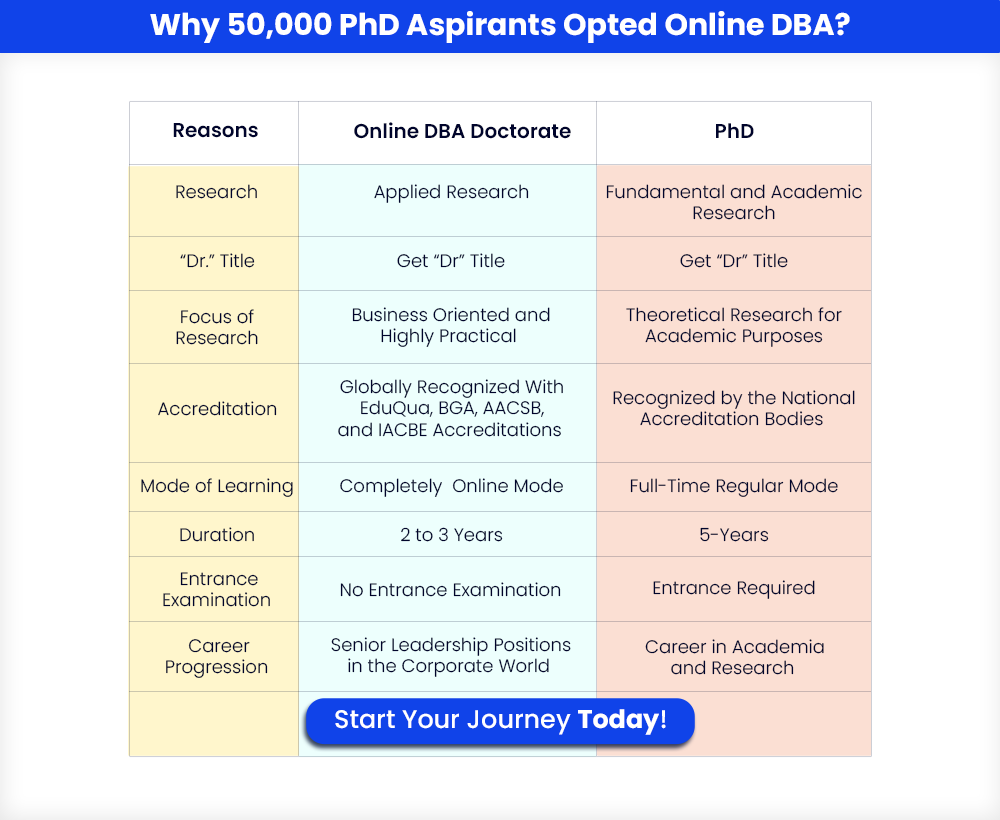Expert Interviews
- University Reviews
- Career Guide
 Video Counseling
Video CounselingImportant Facts
- Ask any Question - CV Forum

Pros & Cons: Full Time vs. Part Time PhD - Which Is Better?
Kopal Srivastava Apr 17, 2025 1.8K Reads

Studying for a PhD full-time pays you more. It allows you to focus more on your research, and with more time, libraries, research labs, and easier access to university resources such as faculty support, students can always align their programs with university activity variety and attend seminars and workshops that provide them with a learning experience.
In contrast, part-time students are more likely to face distractions from work or other responsibilities, which can lead to delays in their progress and thesis completion. One of the main advantages of a full-time PhD is that a Part-time PhD takes seven years, whereas a Full-time PhD only takes 3-5 years to complete.
This early completion allows full-time PhD holders to enter the workforce earlier, find employment, and advance their careers faster. Their benefits include the prestigious title of "Dr," the possibility of higher salaries, and prior opportunities in selected fields.
Overall, a full-time PhD program provides a focused and efficient path to academic and professional success. This guide will help you look at the good and bad points of both options, so you can pick the one that fits your aims and how you live best.
|
Working Professionals Also Looking For |
|
Part-Time vs. Full-Time PhD: Which One Is Right for Me?
Going back to school when you're already working is a big choice if you're thinking about a PhD. You've got to figure out how you'll juggle your time and job. What is the key difference between full-time and part-time PhD programs? It's how long it takes to finish. The coursework and what you need to do are often the same.
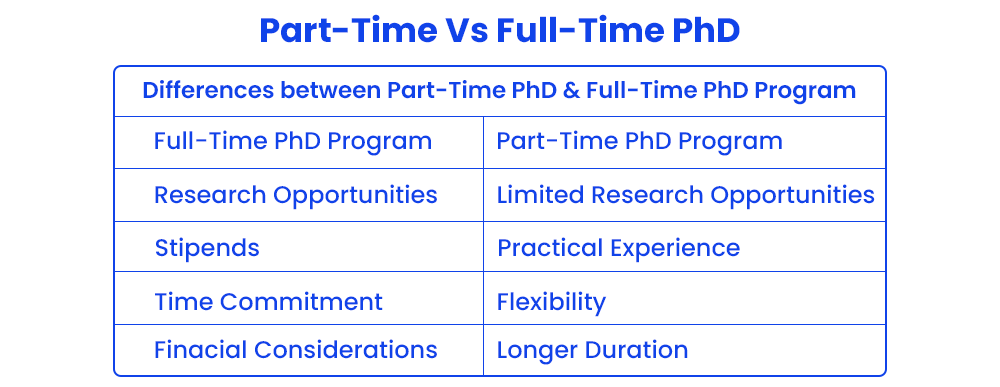
What is the Difference between a Full-time PhD and a Part-time PhD Program?
The main difference between part-time and full-time PhD programs is how long it takes to finish the degree. Both need the same research and study. Still, the experience can change a lot:
Full-time PhD students can spend more time on their studies and research. Part-time students might have other things to do, like work or family, that compete with their coursework. Money helps chances and can change based on whether you work full-time or part-time.
Full-time students might get to dive deeper into their research. Picking the best program depends on how well you can balance your school with other parts of your life. Let's look at what full-time and part-time PhD programs give you to help you make a smart choice.
|
Working Professionals Also Looking for |
|
Everything about a Full-Time PhD Program?
A full-time PhD program is like a full-time program, in which you have to visit college daily and you can even choose a specialization of your choice, expanding your understanding of a particular subject matter and schooling you in studies and collaboration competencies. Here's an average definition of what to anticipate:
- Coursework: You'll begin with graduate publications in your field, including study methods and scholarly writing, to build your expertise base and prepare for the writing you'll do later.
- Research: Outside of training, you'll spend loads of time studying your dissertation, using the abilities discovered in coursework to discover sources, conduct experiments, or perform other tasks.
- Meetings: Regular meetings with your PhD manager are important. These periods are for discussing your development, reviewing research, and getting recommendations.
- Teaching or Fieldwork: Depending on your software, you are probably required to train instructions, entire an internship, or do fieldwork.
- Writing the Dissertation: The dissertation is the culmination of your paintings, combining all of your research, evaluation, and writing. It can take years to finish.
- Defending the Dissertation: After completing your dissertation, you may guard it in an oral exam, supplying your studies and answering questions from a committee. They decide if you've progressed or if changes are wished. After effectively protecting your dissertation and getting committee approval, you may publish the final version and obtain your diploma.
Course Work
Each PhD program varies depending on your field and institution or university, but all student information should always be as follows.
- Year 1: You will have a full semester of academic work, including core courses in your field and courses in general research design and methods.
- Year 2: This year includes semesters of study, including further research and development of your thesis proposal.
- Year 3: As you begin researching and writing your dissertation, your course load decreases. If necessary, you may participate in teaching, clinical, or laboratory work.
- Fourth-year and above: You may have a few classes left, but you spend most of your time researching and writing until you finish your thesis.
Commitment
A full-time PhD program is in-depth, requiring about 35 to 40 hours in line per week, similar to a complete-time process. Most of the time in the first two years may be spent inside the lecture room. After that, you'll give attention to researching, writing, and finishing other crucial obligations.
What is the Duration?
In 2020, there were 55,283 completed Ph.D in the U.S., with an average completion time of 5.8 years, according to the National Science Foundation. Most PhD programs take at least 4 years, but it can take longer, even for full-time students.
How long it takes to finish depends on factors like:
- Struggles with research
- Writing delays
- Extensive revisions are needed for your dissertation
- Life circumstances affecting your studies
Remember, taking longer to finish doesn’t lessen your achievement. If you need extra time or revisions, don’t get discouraged.
A Full-Time PhD Program Could Be a Good Fit If..
Full-time PhD programs are a big time commitment. They might be ideal for students who:
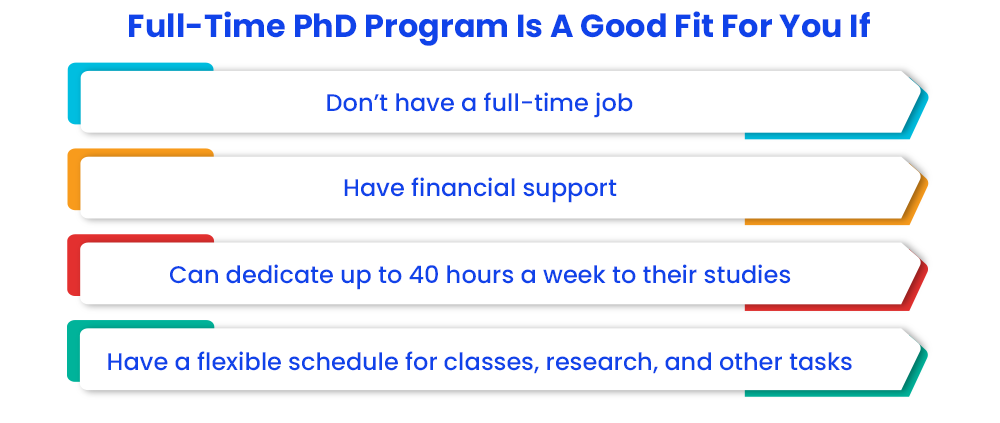
You can start full-time and switch to part-time later if your situation changes.
Everything About A Part-Time PhD Program?
Part-time PhD programs offer students more flexibility. Each student's experience may differ, but common traits include:
- More flexible coursework
- Spread-out costs, reducing the immediate financial burden
- Less disruption to other life commitments
- More time for research
In a part-time program, you have more time for other obligations, but it means being a student for a longer period. The workload is the same as in a full-time program, just spread over more years.
Key differences include:
- Classroom time: You take the same classes but may take three or four years to complete core work instead of one or two.
- Weekly hours: Part-time students spend 15 to 20 hours per week on schoolwork, though this can vary.
- Years to complete: Completion time can range from 5 to 10 years or more.
Part-time PhD programs are variable, especially in terms of how long they take to complete.
Duration of Completion of Part-Time PhD Program
A part-time PhD usually lasts between five and eight years, but this time depends on how much time the university gives you and how much work you put in.
You may end up with more time than you originally thought sooner, or your work and life balance may get in the way, so it takes longer. A full-time PhD usually takes three to four years. However, the title period can be extended up to four years.
How many hours a week is a part-time PhD?
A part-time PhD usually takes five to eight years, depending on the university's timeline and your effort. You might finish sooner if you have more time than expected, or it might take longer if work and life balance are challenging.
A full-time PhD takes three to four years. However, the thesis deadline can sometimes be extended for up to four years.
A Part-Time PhD Program Might Be Right For You If…
Many students find the flexibility of a part-time PhD program beneficial. You might be a good fit if you:
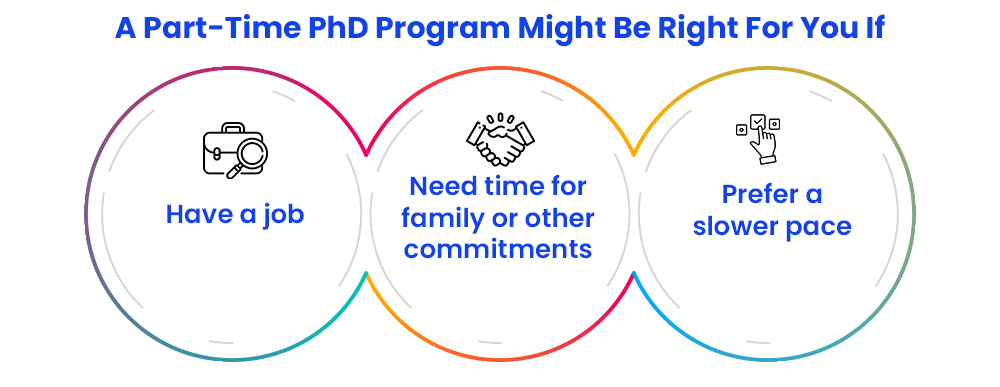
You can start slowly and gradually take on more work as your circumstances allow.
What Are The Pros And Cons Of Studying A Full-Time Ph.D. program?
Full-time Ph.D. It usually takes three to five years, with lots of research and reading. It offers a full-time Ph.D. The program:
Pros
- Research and in-depth understanding: Full-time PhD Students can spend more time researching, which gives them a deeper understanding of the subject. This immersion helps them develop specialized knowledge and skills.
- Frequency of contact with faculty: Being on campus full-time means that students can have frequent contact with their faculty and mentors. This constant interaction provides opportunities to ask questions, seek guidance, and clarify doubts, enhancing the learning experience.
- Access to University Facilities: Full-time students have excellent university facilities such as laboratories and libraries. This process is important for conducting research and obtaining research materials and other resources needed to learn.
- Early graduation: Always PhD. The program can be completed sooner than half-time. Students can focus solely on their studies and may graduate in three to five years.
- Degree value increases: Full-time PhD It seems more radical and comprehensive. This concept can add value to a degree, making it more attractive to employers and educational institutions.
Cons
While a full-time Ph.D. While this program has many benefits, it also comes with some demanding situations:
- Lost wages: Being a full-time student often costs you money because you will be focusing on your research more and would not earn a penny, which can price cash. This can be difficult, particularly when you have financial obligations.
- Duration: Full-time Ph.D. A massive time dedication is needed. You spend hours gaining knowledge of reading and writing, which can be annoying and leave little time for other things.
- High fees: The costs associated with a full-time PhD, which include lessons, books, and living expenses, can add up. Without consistent profits, managing those charges may be tough and may cause economic stress.
- Emotional challenges: Full-time Ph.D. Sometimes, emotions of loneliness, anxiety, and despair get up. Seeing buddies develop their careers while you have a look at them can be hard and affect your intellectual well-being. It is important to be prepared for these emotional ups and downs and try to find help when needed.
|
Popular PhD Specialization In India! |
|
What Are The Pros And Cons Of Studying A Part-Time Program?
Let’s start with the positives of a part-time Ph.D.
- More manageable finances: While not cheap, a Ph.D. They are usually very manageable. You pay a lower annual fee spread over several years, making it easier to balance a part-time job. This process also gives you time to apply for funds that may be available during your study period.
- Less stressful: A part-time PhD Program makes it easier to maintain personal and professional commitments. This is especially useful if you are balancing work or family obligations, such as pursuing a full-time Ph.D. It can be overwhelming in situations like this.
- Transition: Part-time PhD Roles provide flexibility. You can adjust your workload to suit your needs, such as working harder to meet deadlines or slowing down when necessary. When circumstances change, they can sometimes switch to full-time study.
- More opportunities: The longer you stay in the program, the more opportunities you can encounter, such as seminars, publications, and collaborative projects. This can enrich your learning experience, although it can also be difficult to keep up with changes in your career.
- Timeline: Part-time PhD It gives you more time to think about your career path. You may discover new interests or extracurricular career opportunities that you wouldn’t have considered if you rushed through a full-time program.
Cons
Part-time and full-time Ph.D. It’s not straightforward. This would be an easy decision if part-time PhDs were always good, but they are not. Here are some of the reasons:
- Probably not possible: Not all fields or organizations offer part-time Ph.D. The options you have. While this is common in the humanities, part-time courses in other fields are not, especially for self-funding students. International students should also check visa requirements, as some countries only issue student visas for full-time programs.
- Duration: Part-time Ph.D. It often takes longer to complete, which can delay your career progress. This extended timetable can also make it difficult to keep up with your research as other, more important aspects of life compete for your attention. For my career, I faced a difficult period where I almost stopped highlighting how difficult it is to stay focused for long periods.
- Life happens: When you enroll in a part-time Ph.D. At first, it doesn’t seem like much of a problem, and life events can affect your learning over time. Later, you will deal with a variety of distractions, from marriage to petting cats to learning to drive. These events sometimes raised eyebrows for full-time students when their path seemed more straightforward.
- FOMO is Real: Part-time PhD Students may experience a sense of loss (FOMO) when they see their full-time peers making rapid progress. This can be frustrating and can lead to feelings of cheating syndrome. It should be remembered that a Ph.D. Learning is not a sprint, and seeking help when needed is normal and encouraged.
What Are The Other Types Of Ph.D. Program?
There are various types of Ph.D. programs. Some of them are mentioned below.
PhD programs come in a variety of forms. A selection of them is listed below:
- Regular PhD Program: The regular PhD Program requires regular attendance and takes a minimum of three to five years to finish. In addition, if you wish to choose a traditional PhD program, you must pass an entrance exam. Moreover, you must devote all of your attention to your research.
- PhD Program on a Part-Time Basis: The Part-Time PhD program is specially personalized for professionals who work full-time. You must show up for evening classes. Part-time PhDs are awarded to candidates who work in reputable research organizations, academic institutions, or businesses close to the school. While students must complete the same academic courses and criteria as full-time students, a part-time PhD takes 7-8 years to accomplish. Only a few classes are needed to be attended by PhD candidates who work part-time. They need to have an NOC from their employer and a minimum of one year of work experience. The focus of a part-time Ph.D. program is on corporately beneficial research as opposed to individual studies.
- Online PhD Program: Although online PhD programs are still not approved by the UGC, you can still choose to pursue an online DBA (Doctor of Business Administration) as an alternative. The curriculum, which can be finished in a minimum of three to five years, is also for doctorates. Moreover, you do not need to attend college to pursue it.
- PhD Programs for Professionals in the Workforce: Pursuing a Ph.D. while holding a full-time job could be challenging. However, many universities offer flexible curriculum choices for working individuals, known as PhD for working professionals. These classes help students balance their studies and careers. You must have job experience, a valid GATE/NET score (if applicable), and a Master's degree with at least 60% to be eligible for this PhD program for working professionals.
- PhD Global: A Global PhD is a PhD for working professionals that can be pursued from a foreign university. It is a little different from a PhD program offered in an Indian university in terms of eligibility criteria, selection process, fees, syllabus, and job roles. In this mode, you have to pass the entrance exam, and once you pass it, only then can you apply for a PhD Global program.
- PhD Abroad: The duration of a Ph.D. abroad is three to six years, with ample chances. To get admitted, candidates must pass entrance examinations such as the GMAT, SAT, GRE, TOEFL, and IELTS. Ph.D. programs are offered by prestigious universities in the United States, the United Kingdom, Germany, Australia, Japan, Canada, Singapore, and France. Integrated PhD Program This integrated doctoral program is comprehensive and incorporates both a master’s and a doctorate program. The duration to complete it is a minimum of 5-6 years. You can apply for this program right after your bachelor’s.
PhD regulations for offering a PhD Part-Time PhD Program
Universities in India have rules for part-time Ph.D programs, but there are some common criteria. Part-time PhD programs are usually for those who want to work or have other significant commitments. Students must meet the same academic requirements as full-time students, including a valid master’s degree and a good academic record.
The length of time required to complete a part-time PhD is longer than a full-time program, usually lasting six to eight years. Universities may require part-time students to attend campus events, such as seminars or workshops, over some time.
In addition, applicants must seek permission from their employers if they are employed and provide evidence that their PhD research can be used to supervise their employment. Students should consult with specific university regulations, as requirements and policies may vary.
Is the Part-Time PhD Program Recognised by the UGC (University Grants Commission)?
Yes, part-time Ph.D.s are valid and recognized by the University Grants Commission (UGC) of India. The UGC allows universities to offer part-time PhD programs, provided they meet certain quality criteria and guidelines.
These programs are particularly suitable for working professionals who are unable to commit to a full-time study program. A key requirement is that research and learning standards must be equivalent to a full-time program.
Students in part-time PhD programs must, therefore, meet all necessary criteria, including coursework, thesis, and dissertation, just like their full-time counterparts.
PhD Through an Online or a Distance Mode
No university or college can offer PhD programs through distance education or online mode, according to the current regulations. However, candidates who are already employed can pursue a PhD, as long as they meet all the eligibility requirements specified in the existing PhD regulations. Click on the link to check it on the official website of the UGC.
Is a Part-Time PhD valid for an Assistant Professor?
Yes, a part-time PhD is suitable and valid for those aiming to become an assistant professor. Many universities and colleges accept part-time PhDs, as long as the degree meets both academic and research requirements.
The key is to ensure that a part-time PhD program complies with university rules and standards. Universities generally look for strong research candidates, regardless of whether they completed their PhD full-time or part-time.
However, some institutions or universities may have additional or preferred criteria for part-time PhD holders, so it’s a good idea to check with specific university programs. Moreover, although a part-time PhD is valid, it can take longer to complete compared to a full-time program, which can affect the time you can apply for positions.
Balancing research and other commitments can be a challenge, but many successful teaching assistants completed their Ph.D.s part-time. What ultimately matters most is the research you do and how you can support education.
Guidelines of Admission in PhD 2025
According to the recent updates, the NET score will be counted for PhD admission. Now, universities do not need to administer entrance exams.
They have grouped NET scores into three categories. These three categories are:
- Award for JRF & Assistant Professor Appointment
- Promotion to Assistant Professor and PhD Admission
- PhD Admission Only
|
Guidelines of Admission in PhD 2025 |
|||
|
Qualified for |
Eligible for |
||
|
JRF |
Assistant Professor |
PhD Admission |
|
|
Award for JRF & Assistant Professor Appointment |
Yes |
Yes |
Yes |
|
Promotion to Assistant Professor and PhD Admission |
No |
Yes |
Yes |
|
PhD Admission Only |
No |
No |
Yes |
Scope of PhD Program
Below is information on PhD salaries in India for Professors, Associate Professors, and other positions. The table shows the salaries of PhD Professors in India.
|
Job Profile |
Average Annual Salary |
|
Associate Professor |
Rs 4 to 8 Lakhs |
|
Professor |
Rs 7.80 to 30 Lakhs |
|
Consultant |
Rs 8 to 10 Lakhs |
|
Research Scientist |
Rs 6 to 12 Lakhs |
|
Senior Writer |
Rs 10 to 14 Lakhs |
|
Research Assistant |
Rs 3.10 to 5 Lakhs |
|
Computer Engineer |
Rs 4 to 9 Lakhs |
|
Legal Assistant |
Rs 4 to 8 Lakhs |
What are the Guidelines for Change of Registration from Part-Time to Full-Time Ph.D. Program?
If a student in a part-time PhD program wishes to pursue full-time study, an application may be made at the beginning of the semester.
This requires the approval of the Doctoral Progress Committee (DPC) and the Dean of Research/PhD. The student can also leave their job for at least two years to focus on their research after completing the course.
The student is required to provide two Certificates of Objection (NOCs):
One is from their current employer so that they can become a full-time research scientist at the institution where their supervisor is located.
If it is not a PG college/institution affiliated with the University where the invigilator is working, it gives access to the centers.
If the student is unemployed and unable to file an NOC, he/she should be given an undertaking to work as a full-time research scholar in the institution of the sponsor for a minimum of two years.
Conversion from a part-time to a full-time position is permitted only once during the PhD program. During this process, the student cannot change his/her discipline, branch, or research topic. Once the transition to full-time status has been approved, the student must follow all rules and guidelines for full-time research scholars.
To calculate study time, half the time spent as a part-time student counts as full-time study.
Is there an Alternative for a PhD Program?
Yes, there is an alternative to a PhD Program, and the alternative is a DBA (Doctor of Business Administration). It is also a doctorate program that can be completed in a minimum of 3 to 5 years.
Moreover, if you opt for an online DBA, you will be able to earn your doctorate from an international university without even relocating to another country.
Furthermore, you even get an opportunity to study with international faculties who have years of experience and have published their work in top journals, they guide you to the best.
Moreover, many universities are offering you an online DBA. Some of them are mentioned below :
|
Universities |
Fees |
|
INR 8,14,000 |
|
|
INR 8,12,500 |
|
|
INR 8,14,000 |
|
Related Trending Articles |
|
|
Most Popular PhD Fellowships In India: Eligibility, Exams, Amount |
|
|
PhD Admission In Govt Universities [Last Dates, Fees, Eligibility, Entrance] |
|
Conclusion
Studying a PhD full-time pays off big time. It allows you to focus more on your research, and with more time, libraries, research labs, and easy access to university resources like faculty support, students can always align their programs with university activities and attend seminars and workshops that provide them with learning experiences. In contrast, part-time students are more likely to face distractions from work or other responsibilities, which can delay their progress and dissertation completion. One of the major advantages of a full-time PhD is that a part-time PhD takes seven years while a full-time PhD takes only 3-5 years.
FAQs (Frequently Asked Questions)
Both full-time and part-time PhDs have similar value in terms of credibility. The main difference is that a full-time PhD can be completed faster, which may offer some advantages in career progression. However, both types can lead to similar job opportunities and salaries.
The credibility of both degrees is the same. A full-time PhD takes three to five years, while a part-time PhD takes longer. The best choice depends on your circumstances and commitments.
If you qualify with JRF (Junior Research Fellowship) and Assistant Professorship, you can choose to do a full-time PhD with a stipend or work as an Assistant Professor while doing a part-time PhD without a stipend.
Yes, you can switch from part-time to full-time PhD at the beginning of a semester. This requires a recommendation from the Doctoral Progress Committee (DPC) and approval from the Dean of Research/PhD. You must also be able to leave your job for at least two years to focus on your research.
Yes, a part-time PhD is recognized as valid according to UGC guidelines. However, you need a "No Objection Certificate" from your employer and must complete at least six months of coursework full-time.
A part-time PhD is not easier than a full-time PhD. Both require significant effort, commitment, and passion to complete. The main difference is the flexibility in scheduling.
No, the UGC JRF fellowship is only available for full-time PhD students. A part-time PhD does not come with a stipend but is more suited for working professionals who want to continue their job while studying.
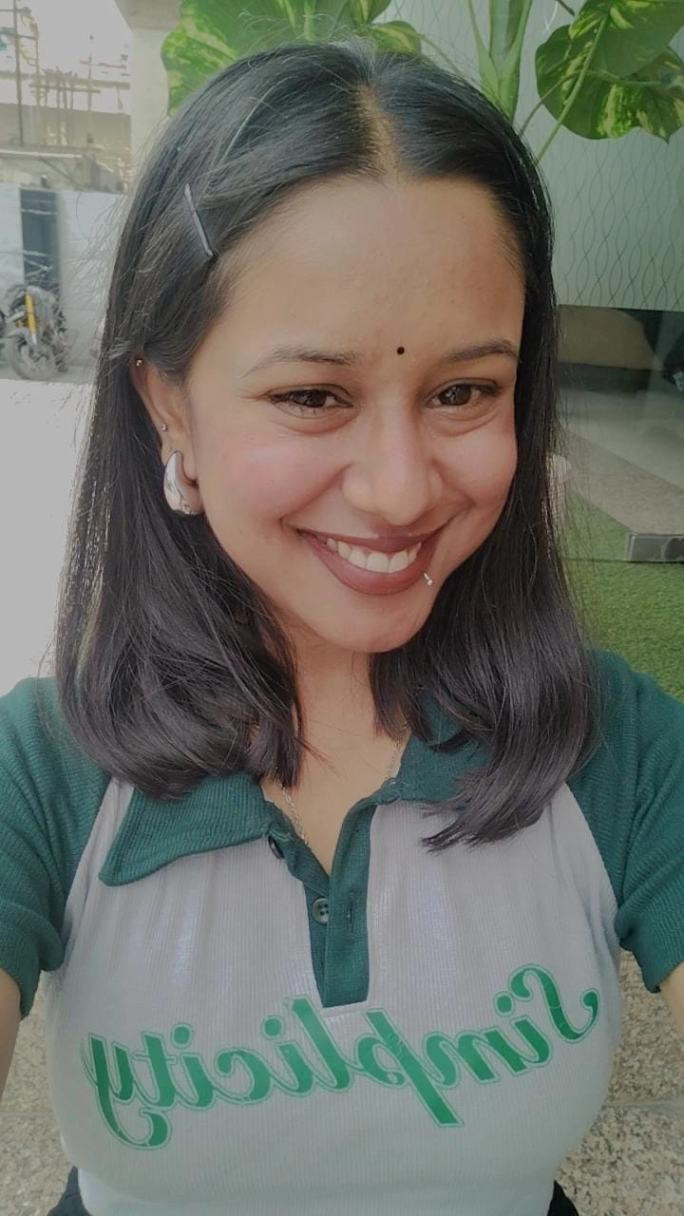
10 Years of Experience / Storyteller / Research-driven Writer
Loves to create story and narrating them through a Podcast
Every query is essential.
Our team of experts, or experienced individuals, will answer it within 24 hours.
Recommended for you
Tired of dealing with call centers!
Get a professional advisor for Career!
LIFETIME FREE
Rs.1499(Exclusive offer for today)

Pooja
MBA 7 yrs exp

Sarthak
M.Com 4 yrs exp

Kapil Gupta
MCA 5 yrs exp
or



Career Finder
(Career Suitability Test)
Explore and Find out your Most Suitable Career Path. Get Started with our Career Finder Tool Now!
ROI Calculator
Find out the expected salary, costs, and ROI of your chosen online university with our free calculator.


